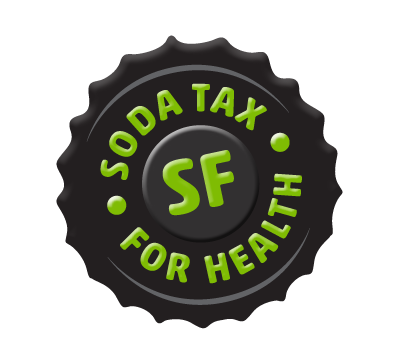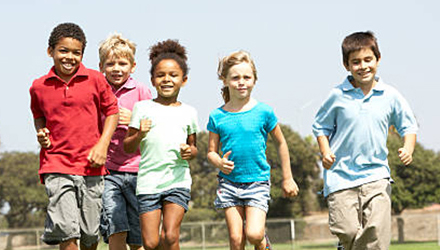Four and a half years after the hard-fought SF soda tax was implemented, the results are in: the tax is working as scientists had predicted. In the two years after the tax was implemented, UC researchers* reported a statistically significant decrease in the amount of sugary beverages purchased in San Francisco, compared to Richmond, CA. The researchers found a 20% decrease in sugary drinks bought in SF compared to Richmond; they also found that purchases of sugary drinks at supermarkets in San Francisco decreased by more than 50%. But that is just the beginning; these numbers don’t tell the complete story.
With that, we welcome you to the SF Soda Tax Blog. This blog will keep you posted on the latest SF soda tax news, stories and results from funded organizations, sugary drink science, and more. We’ll have monthly blogs, sometimes more frequently, sometimes less frequently. If you have a topic you want to hear about let us know!
The Soda Tax is officially called the Sugary Drinks Distributor Tax (SDDT) because it covers non-alcoholic drinks with more than 25 calories of added sugar in a 12 ounce serving, but we’re using Soda Tax for short. There’s also the Sugary Drinks Distributor Tax Advisory Committee (SDDTAC) which we’ll refer to as the Committee.
In this first blog, we’ll review what’s happened since the Soda Tax went into effect; these findings come from the 2019-20 Evaluation Report and the 2020-21 Evaluation Report developed by our evaluation partners Raimi+Associates. You’ll find even more info on this newly updated website.
Most soda tax grantees received their funding in July 2019; half a year before our lives were irrevocably changed in ways unimaginable. Grantees were just getting their programs running when they pivoted to a whole new shelter-in-place world. COVID-19 magnified the inequities that systemic racism has perpetuated; adding yet another layer of injustice. Luckily Soda Tax funding helped strengthen relationships between SFDPH and community-embedded organizations, enabling those organizations to quickly deploy emergency food assistance to community members hardest hit by the pandemic and related economic impacts.
During Fiscal Year 2020-2021, more than 40,100 people participated in Soda Tax funded grant programs like sealants on elementary kids’ teeth, healthy snack champs at SFUSD, wellness and healing programs in the community, free fresh fruits and veggies, doulas for pregnant Latinx, Black/African Americans and Pacific Islanders; nutrition education, and lots of opportunities to get physically active!
Most of the participants in Soda Tax funded programs were Black/African American and Latinx. These are the populations often targeted by the industry and subsequently also have the highest prevalence of diet-related diseases. Additionally, the majority of people were under 25 years old; and more than 3,000 were pregnant when they participated.
Eighty-eight percent of Soda Tax funded staff were people of color and 77% were SF residents: these numbers align with the Committee’s desire to pay people in the priority populations to do the work. And the majority of soda tax funded program participants and program staff lived in Bayview Hunters Point, Civic Center/the Tenderloin, the Excelsior, the Mission, Potrero Hill, and Visitacion Valley.
Lastly, several research projects identified the SF Soda Tax and the Committee as effective in addressing health disparities resulting from the consumption of sugary drinks as well as addressing long-standing inequities. Specifically, the Committee’s values ensured that Soda Tax funded programming focuses on and effectively engages communities most burdened by inequities. And organizations and agencies used Soda Tax funding to help communities experiencing the worst health and economic impacts of the pandemic meet basic needs while simultaneously supporting the structural changes necessary to promote equity.
Those are a few highlights from the past several years. As I wrap up this inaugural blog, I’d like to share that I had the incredible honor and privilege to work with our city leadership to help draft the Soda Tax legislation. To get to help implement the Soda Tax revenue is truly the ultimate dream come true for a public health groupie like me. To witness the incredible good that the Soda Tax has supported and see its potential gives me great hope in an era that is so often beset by pain and despair.
I raise a tall glass of San Francisco tap water in honor of our Soda Tax-funded organizations for taking this important public health work to the next level!
Cheers!
Christina Goette
Healthy Eating/Active Living Program Manager
SDDTAC Backbone and SDDT Grants Program
SF Department of Public Health
*This research was conducted by Justin White and Dean Schillinger at the University of California, San Francisco, Sofia Villas-Boas and Kristine Madsen at the University of California, Berkeley, Scott Kaplan at the U.S. Naval Academy, and Sanjay Basu at Waymark Health. These findings have been submitted to a journal for publication and were in the peer-review process when this evaluation report was finalized in February 2022.


